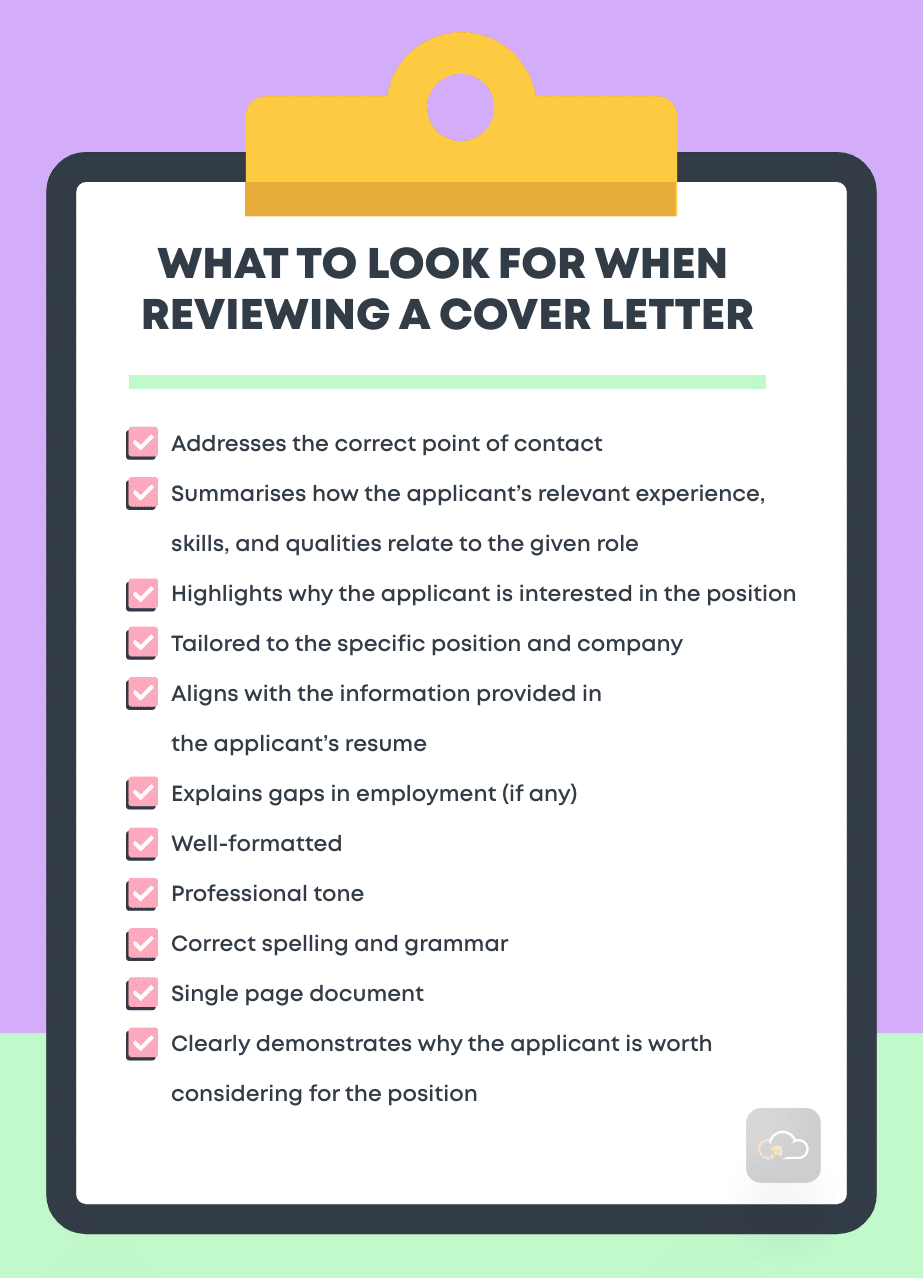Are you the type of human resources professional who pores over cover letters or just gives each one a quick glance? Or maybe—dare we say it—you’re the type who doesn’t even look at cover letters at all.
There is no doubt a variety of HR perspectives when it comes to cover letters. At one end of the spectrum, there are HR professionals who place a high value on them, while at the other, there are those who find them redundant.
Wherever you stand, we’re hoping to open up the conversation with this article. We think it’s an important HR issue that deserves more air time… especially considering that most articles about cover letters are written for job seekers, not for HR professionals!
In this article, we’ll explore reasons for and against asking applicants to include a cover letter. We’ll also arm you with expert tips for effectively reviewing them.
What is a Cover Letter?

A cover letter is a document written by an applicant to support their job application. One page in length, it’s considered to be a supporting document to an applicant’s resume or CV.
A cover letter is intended to serve a number of purposes. The main ones include:
Providing an opportunity for the applicant to:
- Introduce themselves to the hiring manager.
- Highlight their motivation for applying to the given position.
- Outline their professional experience, skills, and qualities, and how they align to the given position.
Providing an opportunity for the human resources professional to:
- Gain a deeper understanding of who the applicant is as a professional.
- Better understand their motivations behind applying for the role.
- Consider whether you would be an ideal fit for the position and company.
Should You Require Applicants to Provide Cover Letters?
Most job applications require applicants to include a cover letter in their application. It’s therefore not much of a stretch to say that the majority of HR professionals find value in receiving applicants’ cover letters. However, as we touch on below, actually having the time to review them properly is a whole other story!
So should you require applicants to provide you with this document? As an employer or HR professional in charge of recruiting, it’s completely up to you whether to request applicants to include a cover letter.
Let’s take a look at both benefits and drawbacks of requiring cover letters.
Benefits
Reviewing applicants’ cover letters gives you a greater insight into who an applicant is. A well-written cover letter will outline the most impressive experiences, skills, and qualities an applicant believes they have to offer your company.
Cover letters give applicants a chance to shine a spotlight on specific experiences and achievements they’re proud of in a more in-depth manner than a resume allows.
They encourage applicants to shine a spotlight on specific experiences and achievements they’re proud of in a more in-depth manner than a resume allows.
Another benefit is that they offer you a different perspective. Cover letters provide applicants with the space to communicate their professional stories to you on a much more personal level than they can in their resumes. For example, they can use their cover letter to explain potential red flags in their resume, such as gaps in employment.
Requiring cover letters is also a quick way to narrow down which applicants can follow directions. If your job ad states that it’s mandatory to include a cover letter and an applicant doesn’t, you may choose to instantly reject their application.
It’s for these reasons that many human resources professionals see this document as a way to distinguish between good and great applicants.
Drawbacks
And the downsides? Well, it already takes significant time and effort to review applicants’ resumes, let alone their cover letters as well. This is perhaps the main reason why many HR professionals are against requiring candidates to provide their cover letter: it takes too much time to review them that they don’t already have.
Cover letters take time to properly review…. time which HR professionals usually lack!
Think about it. On average, each corporate job opening attracts 250 resumes, so any additional time spent reviewing cover letters will quickly add up. Some HR professionals believe it’s only worth asking for cover letters if you can dedicate adequate time to review them properly.
Considering that the average time spent reviewing resumes is only around 7 seconds, it’s evident that many HR professionals don’t have the bandwidth to also deal with reviewing cover letters.
Another drawback is that requiring applicants to provide their cover letter may deter some from applying. While job seekers typically apply for numerous jobs at once, they are constantly weighing up which ones are worth applying for. It takes a substantial amount of time to put together a strong job application, so some applicants may seek applications that don’t take too long to complete.
As you can see, there are plenty of things to consider when deciding whether or not to ask applicants to hand over their cover letters.
What to Look For When Reviewing a Cover Letter (Checklist)
If you do decide to take applicant’s cover letters into consideration, you should be methodical about what you look for.
To determine the most important features to keep an eye out for, we not only consulted our own experts for their advice, but also researched cover letter tips from top HR professionals.
We summarised all of the advice in our cover letter checklist below.

Addresses the correct point of contact: This is a big one for many HR professionals. If you have provided the name of the hiring manager in the job ad, check to see if applicants have correctly addressed their cover letters to this person. Incorrectly spelt names are generally considered a huge no-no. If you haven’t provided the hiring manager’s name, cover letters should be addressed to a relevant point of contact. For example, “Dear Hiring Manager,” “Dear Hiring Team,” and “Dear [Name of Relevant Department]” are considered acceptable in such circumstances.
Summarises how the applicant’s relevant experience, skills, and qualities relate to the given role: Many applicants make the mistake of writing a cover letter that’s solely focused on themselves. A cover letter should highlight how the applicant’s relevant experience, skills, and qualities would allow them to excel in the given role. They should make connections between their professional background and the position’s requirements.
Highlights why the applicant is interested in the position: Employers are looking to bring new talent on board who are passionate about their company and the position at hand. It’s a positive sign if an application mentions why the applicant is interested in the position. After all, someone can tick all of the boxes you’re looking for, but if they lack interest, they will likely prove to be not such a great fit in the end.
Tailored to the specific position and company: Similar to a resume, a cover letter should be tailored to the given position and company. Generic cover letters are considered poor form as they show that the applicant hasn’t put in the time and effort to convince you why they’re an ideal fit for the job. A key sign of a generic cover letter is that it reads like it could be submitted for any position at any company. As you’re reading each cover letter, ask yourself, “Does this cover letter demonstrate how the applicant plans to leverage their experience, skills, and qualities to fulfill the role’s requirements?”
Aligns with the information provided in the applicant’s resume: A cover letter is a complementary document to an applicant’s resume or CV. It should therefore be easy to follow along based on what you’ve read in their resume. Consequently, if it appears like an applicant’s resume and cover letter come from two different people, that’s a good sign of a red flag.
Explains gaps in employment (if any): If an applicant has one or more employment gaps in their resume, check to see if they have addressed them in their cover letter.
Well-formatted: A cover letter should be well-organised using a logical format. It should have a clear beginning, middle, and end, and include both the applicant and company’s contact details. A good rule of thumb is that it should look similar to a business letter format. If you’re unsure of what a standard cover letter looks like, there are plenty of examples online to refer to.
Professional tone: While cover letters provide applicants with room to be a bit more personal, the tone should still be professional above all else.
Correct spelling and grammar: Just like a resume, a cover letter should be free of spelling and grammatical errors. It may not seem like a big deal, but it shows that the applicant took the time and care to proofread their application.
Single page document: It is generally advised that cover letters are kept to one page maximum. It’s meant to be a brief overview, so any more than one page is considered too lengthy.
Clearly demonstrates why the applicant is worth considering for the position: Ultimately, a cover letter should champion the applicant as a desirable candidate for the given position. It should reassure you that their application is worth considering, as they have presented a strong case for why they could potentially be a good fit for the role.
These qualities represent the most fundamental ones you should look for when reviewing applicants’ cover letters. You may have particular qualities you look for that you may wish to add to the checklist above.
Conclusion
There we have it: a rundown on cover letters from an HR perspective. As we explored, whether you should require applicants to provide a cover letter or not isn’t a black and white issue. There are both pros and cons to doing so. The most important thing to remember is that if you do decide to review cover letters, you should make it worth your while by taking a methodical approach. It will no doubt take more time and effort, but in the end, you’ll be rewarded with a more refined pool of suitable candidates to interview.
What are your views on requiring cover letters? Do you have any tips for reviewing cover letters? Let us know in the comments below!

